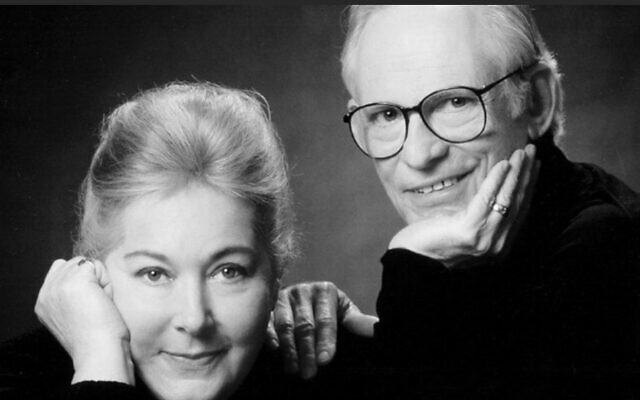Breman to Celebrate Streisand Songwriters
The 2018 Molly Blank Concert Series closes with a Theatrical Outfit tribute to Alan and Marilyn Bergman.

What are you doing the rest of your life
North and South and
East and West of your life
I have only one request of your life
That you spend it all with me.
Alan and Marilyn Bergman wrote the lyrics for the hauntingly beautiful “What Are You Doing the Rest of Your Life” for the 1969 film “The Happy Ending.” Today the film is all but forgotten, but the Bergmans’ words, with music by their frequent collaborator Michel LeGrand, live on.
This year, as they celebrate their 60th wedding anniversary, Marilyn Bergman at 92 and Alan Bergman at 96 have one of the longest-running love affairs in Hollywood.
While they might not be household names to most of us, we do know many of the hundreds of songs they’ve written that celebrate love and life.
They have won three Academy Awards. The first was for “The Windmills of Your Mind” from the 1968 Steve McQueen/Faye Dunaway film, “The Thomas Crown Affair.”
The second was for “The Way We Were,” the Barbra Streisand film of the same name in 1973, and, finally, they grabbed an important Oscar for the lyrics to the 10 songs in “Yentl,” Streisand’s 1983 masterwork and one of the most successful Hollywood films about Jewish life.
The Breman Museum will celebrate the lives and works of the Bergmans at 5 p.m. Sunday, June 3, in the third and final show of the 2018 Molly Blank Concert Series: “The Way We Were,” a musical journey produced by Atlanta’s Theatrical Outfit.
Alan and Marilyn Bergman were born in the same hospital in Brooklyn and grew up in the same sort of middle-class Jewish home, including piano lessons beginning at age 6 and mandatory visits to the Saturday afternoon Carnegie Hall children’s concerts of the New York Philharmonic.
The strong influence of growing up Jewish in what was at the time the largest Jewish city in the world is something that Adam Koplan, who created the production for the Breman, has tried to emphasize.
“The Bergmans themselves have credited the exodus narrative of all the Eastern European Jews coming from places in the Pale of Settlement to the kind of Brooklyn culture that was the crucible that forged them and their lives,” Koplan said.
But while Brooklyn Jewish life was a strong and formative influence, it was not until they each moved to Los Angeles in the 1950s that they finally met.
They were writing lyrics for the same pop music composer — she in the morning, he in the afternoon — when they finally were introduced in 1956. They married two years later.
Alan didn’t have the money for a ring, so he wrote her a song instead. It’s the only full song he has ever written without her.
Through the years they’ve worked for just about all the music greats of our time, from Frank Sinatra and Tony Bennett to Fred Astaire and Ray Charles. They have created the theme music for two of Norman Lear’s biggest hits, “Happy Days” and “Maude,” and have been nominated for Oscars 16 times.
Their longest-running and most successful partnership has been with Streisand, for whom they have written more than 60 songs, many of them favorites in her large repertoire. She paid tribute to them in a program presented by the Academy of Motion Picture Arts and Sciences, the home of the Oscars, in 2009.
“Their lyrics are profound, poetic and very conversational,” Streisand said. “They have the most exquisite way of expressing affairs of the heart … with specifics and detailed observations that make it so easy for me, as an actress, to relate to.”
The Bergmans returned the compliment.
“When we write a song, we hear Barbra,” they said. “She makes the connection from the heart to the mind, and it emerges through her voice.”
Streisand’s 2011 recording “What Matters Most” celebrated 20 of her favorite Bergman compositions in a two-disc deluxe edition.
In Hollywood, where friendships and working relationships are often as disposable as a paper towel, the Bergmans’ relationships endure.
As Theatrical Outfit’s Koplan said: “Everybody loves them. They seem, through four or five decades of public interviews, to have tremendous affection for each other. Barbra can’t stop gushing about them at every opportunity. Similarly with Quincy Jones, Michel Legrand and all their collaborators.”
Marilyn Bergman once said that their compositions have been woven through the fabric of the lives of many people they have known.
“People have told us,” she has said, “that they have married to ‘What Are You Doing With the Rest of Your Life,’ broke up with ‘Where Do You Start?’ and divorced with ‘The Way We Were.’”
After more than six decades of creating beautiful music together for the world and for each other, they are still working on what they are doing for the rest of their lives.
What: “The Way We Were,” a tribute to Alan and Marilyn Bergman
Who: Theatrical Outfit
Where: Breman Museum, 1440 Spring St., Midtown
When: Sunday, June 3, with a reception at 4 p.m. and the concert at 5
Tickets: $50 for Breman members, $60 for others, with discounts for students and young adults; www.thebreman.org or 678-222-3700



comments